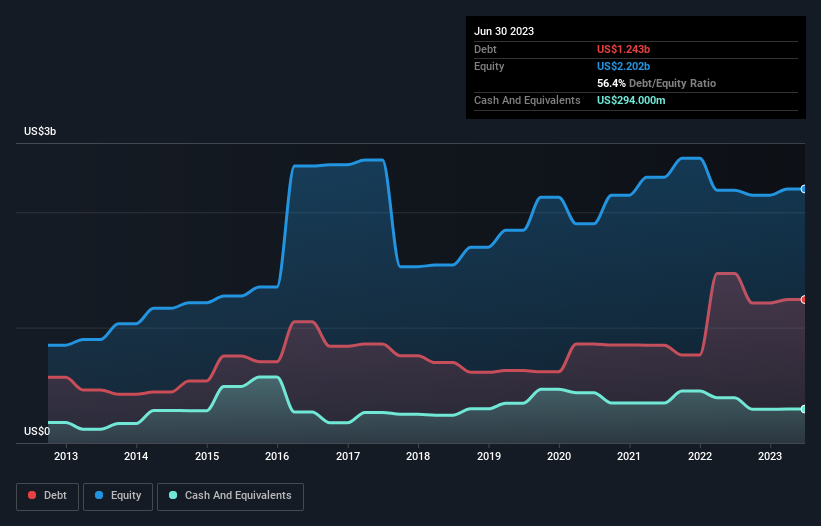
Some say volatility, rather than debt, is the best way to think about risk as an investor, but Warren Buffett famously said that 'Volatility is far from synonymous with risk.' When we think about how risky a company is, we always like to look at its use of debt, since debt overload can lead to ruin. We note that Hikma Pharmaceuticals PLC (LON:HIK) does have debt on its balance sheet. But the more important question is: how much risk is that debt creating?
When Is Debt A Problem?
Generally speaking, debt only becomes a real problem when a company can't easily pay it off, either by raising capital or with its own cash flow. If things get really bad, the lenders can take control of the business. However, a more frequent (but still costly) occurrence is where a company must issue shares at bargain-basement prices, permanently diluting shareholders, just to shore up its balance sheet. Of course, debt can be an important tool in businesses, particularly capital heavy businesses. The first step when considering a company's debt levels is to consider its cash and debt together.
Check out our latest analysis for Hikma Pharmaceuticals
What Is Hikma Pharmaceuticals's Debt?
You can click the graphic below for the historical numbers, but it shows that Hikma Pharmaceuticals had US$1.24b of debt in June 2023, down from US$1.47b, one year before. However, because it has a cash reserve of US$294.0m, its net debt is less, at about US$949.0m.

How Healthy Is Hikma Pharmaceuticals' Balance Sheet?
According to the last reported balance sheet, Hikma Pharmaceuticals had liabilities of US$1.22b due within 12 months, and liabilities of US$1.20b due beyond 12 months. Offsetting these obligations, it had cash of US$294.0m as well as receivables valued at US$905.0m due within 12 months. So it has liabilities totalling US$1.22b more than its cash and near-term receivables, combined.
This deficit isn't so bad because Hikma Pharmaceuticals is worth US$5.75b, and thus could probably raise enough capital to shore up its balance sheet, if the need arose. But we definitely want to keep our eyes open to indications that its debt is bringing too much risk.
In order to size up a company's debt relative to its earnings, we calculate its net debt divided by its earnings before interest, tax, depreciation, and amortization (EBITDA) and its earnings before interest and tax (EBIT) divided by its interest expense (its interest cover). The advantage of this approach is that we take into account both the absolute quantum of debt (with net debt to EBITDA) and the actual interest expenses associated with that debt (with its interest cover ratio).
With net debt sitting at just 1.2 times EBITDA, Hikma Pharmaceuticals is arguably pretty conservatively geared. And it boasts interest cover of 9.3 times, which is more than adequate. On the other hand, Hikma Pharmaceuticals saw its EBIT drop by 2.7% in the last twelve months. If earnings continue to decline at that rate the company may have increasing difficulty managing its debt load. There's no doubt that we learn most about debt from the balance sheet. But it is future earnings, more than anything, that will determine Hikma Pharmaceuticals's ability to maintain a healthy balance sheet going forward. So if you want to see what the professionals think, you might find this free report on analyst profit forecasts to be interesting.
But our final consideration is also important, because a company cannot pay debt with paper profits; it needs cold hard cash. So we always check how much of that EBIT is translated into free cash flow. Looking at the most recent three years, Hikma Pharmaceuticals recorded free cash flow of 49% of its EBIT, which is weaker than we'd expect. That's not great, when it comes to paying down debt.
Our View
Both Hikma Pharmaceuticals's ability to to cover its interest expense with its EBIT and its net debt to EBITDA gave us comfort that it can handle its debt. Having said that, its EBIT growth rate somewhat sensitizes us to potential future risks to the balance sheet. When we consider all the elements mentioned above, it seems to us that Hikma Pharmaceuticals is managing its debt quite well. Having said that, the load is sufficiently heavy that we would recommend any shareholders keep a close eye on it. The balance sheet is clearly the area to focus on when you are analysing debt. But ultimately, every company can contain risks that exist outside of the balance sheet. Be aware that Hikma Pharmaceuticals is showing 5 warning signs in our investment analysis , you should know about...
At the end of the day, it's often better to focus on companies that are free from net debt. You can access our special list of such companies (all with a track record of profit growth). It's free.
Valuation is complex, but we're here to simplify it.
Discover if Hikma Pharmaceuticals might be undervalued or overvalued with our detailed analysis, featuring fair value estimates, potential risks, dividends, insider trades, and its financial condition.
Access Free AnalysisHave feedback on this article? Concerned about the content? Get in touch with us directly. Alternatively, email editorial-team (at) simplywallst.com.
This article by Simply Wall St is general in nature. We provide commentary based on historical data and analyst forecasts only using an unbiased methodology and our articles are not intended to be financial advice. It does not constitute a recommendation to buy or sell any stock, and does not take account of your objectives, or your financial situation. We aim to bring you long-term focused analysis driven by fundamental data. Note that our analysis may not factor in the latest price-sensitive company announcements or qualitative material. Simply Wall St has no position in any stocks mentioned.
About LSE:HIK
Hikma Pharmaceuticals
Develops, manufactures, markets, and sells a range of generic, branded, and in-licensed pharmaceutical products.
Very undervalued established dividend payer.


